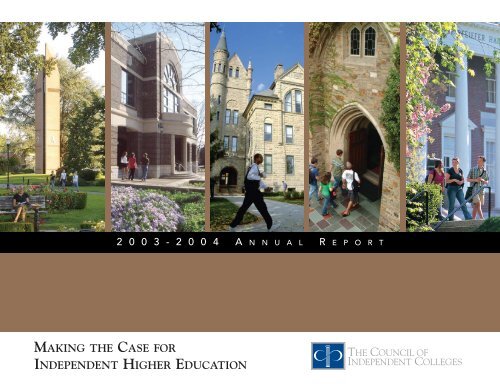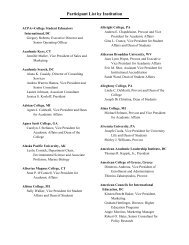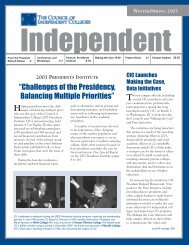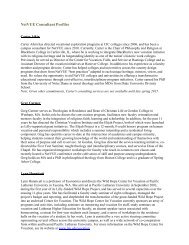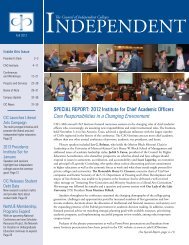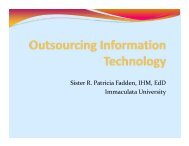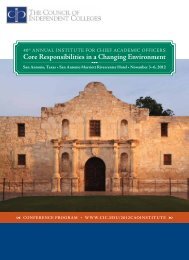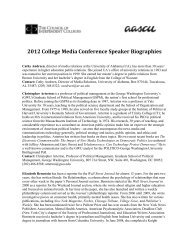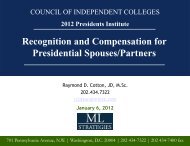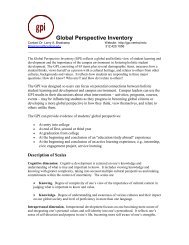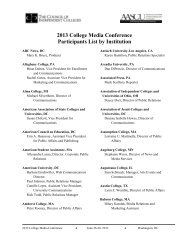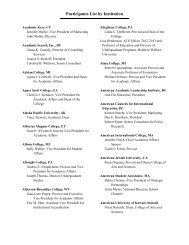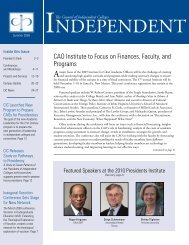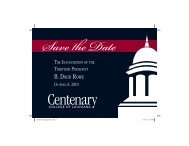Annual Report 2003-2004 - The Council of Independent Colleges
Annual Report 2003-2004 - The Council of Independent Colleges
Annual Report 2003-2004 - The Council of Independent Colleges
- No tags were found...
You also want an ePaper? Increase the reach of your titles
YUMPU automatically turns print PDFs into web optimized ePapers that Google loves.
2 0 0 3 - 2 0 0 4 A N N U A L R E P O R TMAKING THE CASE FORINDEPENDENT HIGHER EDUCATION
COVER PHOTO CREDITS (LEFT TO RIGHT)GEORGE FOX UNIVERSITY (OR), DRURY UNIVERSITY (MO), OBERLIN COLLEGE (OH),RHODES COLLEGE (TN), ALBRIGHT COLLEGE (PA)INSIDE COVER PHOTO CREDITS (LEFT TO RIGHT)BENEDICTINE UNIVERSITY (IL), HOUGHTON COLLEGE (NY), DORDT COLLEGE (IA)FOUNDED IN 1956, THE COUNCIL OF INDEPENDENT COLLEGES (CIC) IS AN ASSOCIATION OFINDEPENDENT COLLEGES AND UNIVERSITIES WORKING TOGETHER TO:■ SUPPORT COLLEGE AND UNIVERSITY LEADERSHIP,■ ADVANCE INSTITUTIONAL EXCELLENCE, AND■ ENHANCE PRIVATE HIGHER EDUCATION'S CONTRIBUTIONS TO SOCIETY.CIC IS THE MAJOR NATIONAL SERVICE ORGANIZATION FOR ALL SMALL AND MID-SIZED, INDEPENDENT,LIBERAL ARTS COLLEGES AND UNIVERSITIES IN THE UNITED STATES. CIC IS NOT A LOBBYING ORGANIZATION,BUT RATHER FOCUSES ON PROVIDING SERVICES TO CAMPUS LEADERS AS WELL AS SEMINARS, WORKSHOPS,AND PROGRAMS THAT ASSIST INSTITUTIONS IN IMPROVING EDUCATIONAL PROGRAMS, ADMINISTRATIVEAND FINANCIAL PERFORMANCE, AND INSTITUTIONAL VISIBILITY.
T ABLE OF C ONTENTSMessage from the ChairMessage from the PresidentMaking the CaseConnecting LeadersPromoting High-Quality EducationStimulating ReformForming Collaborations<strong>2003</strong>-<strong>2004</strong> AwardeesResource DevelopmentFinancial StatementBoard <strong>of</strong> DirectorsAdvisory Committees and Task ForcesInstitutional MembersInternational and Associate MembersAffiliate MembersCIC Staff and AdvisorsConnecting with CIC234812171821222324262933343537<strong>2003</strong>-<strong>2004</strong> ANNUAL R EPORT 1
M ESSAGE FROM THE C HAIRMARY PAT SEURKAMP, CHAIRMaking the case for the effectiveness <strong>of</strong> small andmid-sized independent colleges and universities is achallenge that all CIC member presidents must tackle. Wehave a great story to tell and recent research underscoresthe public’s confidence in private higher education. It will,however, always be important to articulate, with certaintyand passion, the qualities <strong>of</strong> the excellent educationalprogram our colleges deliver. <strong>The</strong> CIC Board <strong>of</strong> Directorshas directed CIC to undertake an ambitious initiative to helpmake that case. In fact, my first year as chair <strong>of</strong> the CICBoard <strong>of</strong> Directors has been focused on the launch <strong>of</strong> theMaking the Case Initiative.This several-year effort, combined with an EnhancingDecision-Making Initiative, enables CIC to collect data onindependent colleges and universities and to develop thecapacity to analyze those data, which will be useful in CIC’spromotion <strong>of</strong> this sector and in helping institutions usecomparative data for decision-making purposes.Of course, the <strong>Council</strong> has been involved in myriad otherprojects and services that meet the needs, interests, and concerns<strong>of</strong> member institutions. <strong>The</strong>se are described in detail inthis <strong>Annual</strong> <strong>Report</strong>.I am also pleased to report that CIC’s membershipcontinues its steady growth—the final total for <strong>2003</strong>-<strong>2004</strong>represented a record level <strong>of</strong> 522 institutional members. Inaddition, participation in the <strong>Council</strong>’s major conferencesremains high—attendance at the <strong>2004</strong> Presidents Instituteequaled the previous year’s record level, and the number <strong>of</strong>participants attending the <strong>2003</strong> Institute for Chief AcademicOfficers was one <strong>of</strong> the highest ever.CIC’s growth and the continual creation and implementation<strong>of</strong> so many initiatives are indeed proving the <strong>Council</strong>’ssuccess in serving and making the case for independent highereducation, connecting and listening to its leaders, promotinghigh-quality education, stimulating reform, and formingcollaborations to create and strengthen programs.Mary Pat SeurkampPresident, College <strong>of</strong> Notre Dame <strong>of</strong> MarylandChair, CIC Board <strong>of</strong> Directors2C OUNCIL OF I NDEPENDENT C OLLEGES
M ESSAGE FROM THE P RESIDENT<strong>The</strong> theme <strong>of</strong> this year’s annual report, “Making the Casefor <strong>Independent</strong> Higher Education,” reflects a commitmentundertaken by CIC at the urging <strong>of</strong> its member presidents,chief academic <strong>of</strong>ficers, and Board <strong>of</strong> Directors to helpmake a stronger case for the forms <strong>of</strong> education <strong>of</strong>fered bysmall to mid-sized, teaching-oriented, private colleges anduniversities, and to collect and disseminate data and informationon the independent sector <strong>of</strong> higher education.During the past year, CIC commissioned two studies andcollected other national data that can help to document theeffectiveness <strong>of</strong> independent colleges and universities.Currently CIC is developing tools based on those data thatwill help campus leaders make a more effective case for theirown institutions. In related activities, CIC held a symposiumin November <strong>2003</strong> for institutional presidents and corporateCEOs to explore how leaders in both business and independentinstitutions <strong>of</strong> higher education can benefit from theconnections between the liberal arts and business careers.<strong>The</strong> <strong>Council</strong> also created a new Key Indicators Tool thatprovides comparative institutional data on critical ratios.This tool, sent to member presidents in summer <strong>2004</strong>, ispart <strong>of</strong> another CIC data-intensive effort to EnhanceDecision-Making.While the Making the Case and Enhancing Decision-Making Initiatives have constituted a major effort during<strong>2003</strong>-<strong>2004</strong>, the <strong>Council</strong> has also launched several other newprograms, services, and cooperative activities. Highlights forthe year, which are described in the following pages, include:Publications. CIC issued three publications in <strong>2003</strong>-<strong>2004</strong>:Information Technology Benchmarks: A Practical Guide forCollege and University Presidents; <strong>Report</strong> <strong>of</strong> a Symposium on theLiberal Arts and Business; and a web-based publication,“Effective Practices Exchange,” that caps a decade <strong>of</strong> work on<strong>of</strong>f-campus student learning and community engagement.Presidential Services and Programs. Several CIC serviceshave enabled presidents to meet in order to advise one another,brought together presidents and trustees, and providedconsultants on such issues as financial management and president-boardrelations. In addition, a first-ever PresidentsLeadership Summit was held at the Micros<strong>of</strong>t Corporationheadquarters in Redmond, Washington. It included 28 collegepresidents who explored with Micros<strong>of</strong>t experts the technology-influencedapproaches to learning and communication <strong>of</strong>the upcoming “millennial generation” <strong>of</strong> students.Other Programs and Services. CIC selected two collegesto receive the Heuer Award for Outstanding Achievement inUndergraduate Science Education; sponsored several workshopson “Transformation <strong>of</strong> the College Library”; co-sponsoredwith the Gilder Lehrman Institute <strong>of</strong> American Historya seminar on “Slavery: Scholarship and Public History”; andcollaborated with the <strong>Council</strong> <strong>of</strong> American OverseasResearch Centers to <strong>of</strong>fer a seminar for CIC faculty memberson “Teaching About Islam and the Middle East.”Thanks are due to many CIC members, the Board <strong>of</strong>Directors, sponsors and other funders, and staff colleagues whocontributed to these successes.Richard EkmanPresident<strong>Council</strong> <strong>of</strong> <strong>Independent</strong> <strong>Colleges</strong>RICHARD EKMAN, PRESIDENT<strong>2003</strong>-<strong>2004</strong> ANNUAL R EPORT3
I N D E P E N D E N T H I G H E R E D U C A T I O N■■■■Student Learning and Life—faculty-student interaction,rigor and engagement in class, prevalence <strong>of</strong> extra- and cocurricularlearning, communities that support learning andemphasize values and ethics.Student Success—degree completion, acquisition <strong>of</strong> broadlife and career skills, acquisition <strong>of</strong> values and ethics, completion<strong>of</strong> graduate degrees, income, role <strong>of</strong> faculty references,value <strong>of</strong> institution’s academic reputation.Satisfaction with Education—satisfaction with educationand preparation for life after college, financial and volunteersupport for undergraduate institutions, belief that privateeducation was a worthwhile investment.Contribution to the Public Good by private colleges, theirstudents, and graduates—volunteering and communityservice, personal values and priorities, employment inand/or financial support for nonpr<strong>of</strong>it and educationalorganizations, financial and personal involvement withchurches.<strong>The</strong> data collection and analysis is being converted intomaterials that will serve as resources for CIC memberpresidents as they communicate with a wide range <strong>of</strong> audiences;provide tools that can help CIC to speak on behalf <strong>of</strong>private colleges and universities to philanthropic and businessleaders; and establish CIC as a reliable source <strong>of</strong> informationabout higher education in general and private colleges anduniversities in particular.A variety <strong>of</strong> other programs and services <strong>of</strong>fered by CIC inthe past year also promotes the distinctive features <strong>of</strong> education<strong>of</strong>fered by small to mid-sized, teaching-oriented, privatecolleges and universities.Liberal Arts and Business Careers Symposium—Ten CICmember presidents and ten business executives met atElmhurst College (IL) in November <strong>2003</strong> to explore howleaders in both the corporate community and at independentinstitutions <strong>of</strong> higher education can benefit from a betterunderstanding <strong>of</strong> the connections between the liberal arts andbusiness.During the day-long meeting, participants spent time focusingon barriers to the appreciation <strong>of</strong> the liberal arts. <strong>The</strong>ydiscussed specific steps that business and educational leaderscould take to work together more effectively to preparetomorrow’s leaders, especially in business, and recommendedways to advocate more effectively for the value <strong>of</strong> liberal artseducation.A grant from the James S. Kemper Foundation supportedthe Symposium. <strong>The</strong> project co-moderaters were Pr<strong>of</strong>essorHarry L. Davis <strong>of</strong> the University <strong>of</strong> Chicago Graduate School<strong>of</strong> Business and CIC Senior Advisor Thomas F. Flynn, whodirected the project. In July <strong>2004</strong>, CIC published a <strong>Report</strong> <strong>of</strong> aSymposium on the Liberal Arts and Business, which includes asummary <strong>of</strong> the day’s discussion as well as a collection <strong>of</strong> individualstatements. Participants included:College Presidents—Charles J. Beirne, S.J., Le MoyneCollege (NY); Richard J. Cook, Allegheny College (PA);Bryant L. Cureton, Elmhurst College (IL); Jonathan P.DeFelice, OSB, Saint Anselm College (NH); Andrew T. Ford,Wabash College (IN); William V. Frame, Augsburg College(MN); Karen I. Halbersleben, Northland College (WI); ToddS. Hutton, Utica College (NY); Michael Lomax, then president<strong>of</strong> Dillard University (LA), now president <strong>of</strong> the UnitedNegro College Fund; and Michael A. MacDowell, CollegeMisericordia (PA).ST. JOHN FISHER COLLEGE, NY<strong>2003</strong>-<strong>2004</strong> ANNUAL R EPORT 5
M A K I N G T H E C A S E F O RELMHURST COLLEGE, ILBusiness Executives— John W. Bachmann, Edward Jones(MO); Peter C. Browning, Nucor Corporation and QueensUniversity (NC); Murray Dashe, Cost Plus World Market(CA); Marlin Miller, Arrow International, Inc. (PA); JeffreyE. Payne, Cigital (VA); Arthur Rasmussen, HouseholdInternational (NY); Marvin Suomi, Kajima Corporation(NJ); William Travis, McGladrey & Pullen (MN); Peggy L.Young, NOVA Research (MD); and Paul Young, NOVAResearch (MD).Educating Low-Income Students: Access and Success—With a grant from the Lumina Foundation for Education, CICcompleted a book <strong>of</strong> essays by college and university presidentsabout the ways their institutions are successfully educatinglow-income students. <strong>The</strong> presidents <strong>of</strong> 15 institutions,chosen from 47 who expressed interest, prepared essaysdescribing institutional efforts to promote access to and successin college for individuals from low-income families. <strong>The</strong>essays explore such topics as preparing prospective students forthe challenges <strong>of</strong> college, outreach to increase awareness <strong>of</strong>college opportunities, student financial aid strategies, studentadvising and support systems, instructional support, andincentives for completion <strong>of</strong> educational programs. <strong>The</strong> book,Powerful Partnerships: <strong>Independent</strong> <strong>Colleges</strong> Share High-impactStrategies for Low-income Students’ Success, was published inOctober <strong>2004</strong> as part <strong>of</strong> the New Agenda Series by theLumina Foundation for Education.John Noonan, president emeritus <strong>of</strong> Bloomfield College(NJ), and CIC staff edited the volume. Authors includeDorothy Blaney, Cedar Crest College (PA); Jacqueline Doud,Mount St. Mary’s College (CA); Lorna Edmundson, WilsonCollege (PA); Betty Landman, then president <strong>of</strong> ArcadiaUniversity (PA); Andrea Lee, IHM, College <strong>of</strong> St. Catherine(MN); Michael Lomax, then president <strong>of</strong> Dillard University(LA); George Martin, St. Edward’s University (TX); DouglasNorth, Alaska Pacific University; Gregory Prince, HampshireCollege (MA); Kathleen Ross, SNJM, Heritage University(WA); Richard Santagati, Merrimack College (MA); MaryPat Seurkamp, College <strong>of</strong> Notre Dame <strong>of</strong> Maryland; LarryShinn, Berea College (KY); Barbara Sirvis, Southern VermontCollege; and Henry Tisdale, Claflin University (SC).Serving on the editorial advisory committee were LarryEarvin, president, Huston-Tillotson College (TX); LeeFritschler, pr<strong>of</strong>essor, School <strong>of</strong> Public Policy, George MasonUniversity (VA); Jamie Merisotis, president, Institute forHigher Education Policy; John Noonan, president emeritus,Bloomfield College (NJ); and Matthew Quinn, executivedirector, Jack Kent Cooke Foundation.Survey <strong>of</strong> Historic Architecture and Design on the<strong>Independent</strong> College and University Campus—Thisproject, funded by a grant from the Getty Grant Program todocument American campus architectural heritage, has beenunderway at CIC for the past two years. <strong>The</strong> survey was completedby 362 institutions in fall <strong>2003</strong>, representing a return <strong>of</strong>more than 50 percent <strong>of</strong> the original list <strong>of</strong> schools that wereinvited to participate. More than 1,900 places <strong>of</strong> historicalsignificance on private college and university campuses havebeen identified, and 3,600 images relating to sites <strong>of</strong> architectural,landscape, and planning interest and significance havebeen collected.Project staff have begun to evaluate the survey data. <strong>The</strong>yare developing a database that will ultimately be turned into aweb-based image archive tool and gallery.6C OUNCIL OF I NDEPENDENT C OLLEGES
I N D E P E N D E N T H I G H E R E D U C A T I O N<strong>The</strong> website will make these collected data widely availableand provide an interpretive framework. CIC is alsoplanning a publication series which will be organizedgeographically.Barbara Christen, CIC senior advisor and an architecturalhistorian formerly affiliated with the National Gallery <strong>of</strong>Art, is heading the project. <strong>The</strong> project’s advisory committeeconsists <strong>of</strong> Thomas C. Celli, A.I.A., president, Celli-FlynnBrennan Turkall Architects and Planners; Russell V. Keune,F.A.I.A., former director, international relations, AmericanInstitute <strong>of</strong> Architects; Randall Mason, pr<strong>of</strong>essor, GraduateProgram in Historic Preservation, University <strong>of</strong>Pennsylvania; <strong>The</strong>rese O’Malley, associate dean, Center forAdvanced Study in the Visual Arts, National Gallery <strong>of</strong> Art;Damie Stillman, pr<strong>of</strong>essor emeritus, University <strong>of</strong> Delaware;and John Strassburger, president, Ursinus College (PA).MAKING THE CASE TO THE MEDIAWorking with the Media—CIC continued to co-sponsor anannual event for public relations directors. <strong>The</strong> CIC workshop,“Helping Your Faculty Gain More Media Attention,”preceded a two-day conference held in June <strong>2004</strong> inPhiladelphia, on “How <strong>Colleges</strong> and Universities CanObtain National (and Regional) Publicity.”Communications Resources—Three issues <strong>of</strong>“Communications Resources,” designed to help presidentsand PR <strong>of</strong>ficers communicate their own institutions’ stories,were produced and distributed in <strong>2003</strong>-<strong>2004</strong>. <strong>The</strong> periodicmailing contains practical, relevant material and tools—talking points, data, how-to pieces, backgrounders, and lettersto the editor and op-ed pieces from member presidentsthat make the case for independent higher education.ENHANCING DECISION-MAKINGIn addition to the importance <strong>of</strong> data in Making the Case,CIC has also been encouraging the use <strong>of</strong> data to enhanceinstitutional decision-making.Data and Decision Workshops—CIC continues to co-sponsor,with the Association for Institutional Research (AIR),workshops on the use <strong>of</strong> comparative data in institutionaldecision-making. Grant funds are available to support oneworkshop per year for the next two years. Three workshopshave been held in prior years. <strong>The</strong> most recent one held inSeptember <strong>2004</strong> in Charlotte, NC focused on the role <strong>of</strong>strategic assessment in institutional management.Participants included teams from Albertson College (ID),American College <strong>of</strong> Greece, Benedictine College (KS),Cabrini College (PA), College <strong>of</strong> Mount St. Joseph (OH),College <strong>of</strong> Saint Benedict/Saint John’s University (MN),Converse College (SC), Dean College (MA), Dordt College(IA), Elmira College (NY), Flagler College (FL), FriendsUniversity (KS), Gannon University (PA), Lees-McRaeCollege (NC), Lynchburg College (VA), Marietta College(OH), Mount Aloysius College (PA), Pacific LutheranUniversity (WA), Paul Smith’s College (NY), Roger WilliamsUniversity (RI), Saint Leo University (FL), Siena College(NY), Sterling College (KS), Wesleyan College (GA), andWilmington College (OH).Key Indicators Tool—CIC created a Key Indicators Tool thatprovides comparative information in the areas <strong>of</strong> enrollmentand retention, faculty, and finance. Each CIC member presidentreceived an individualized report in June <strong>2004</strong>, designedto help the institution to benchmark itself against similarinstitutions.DUQUESNE UNIVERSITY, PA<strong>2003</strong>-<strong>2004</strong> ANNUAL R EPORT 7
C ONNECTINGL EADERS<strong>2004</strong> PRESIDENTS INSTITUTECIC provides opportunities—in conferences, meetings,confidential consultations, and listservs—for campusleaders to share ideas and learn from one another. Among theprograms and services:PROGRAMS FOR PRESIDENTSPresidents Institute—CIC’s <strong>2004</strong> Institute provided presidentswith ideas, leadership enhancement strategies, andnetworking opportunities. <strong>The</strong> Institute, under the theme <strong>of</strong>Successful Institutions in a Changing World, equaled last year’srecord attendance <strong>of</strong> 290 presidents (representing 54 percent<strong>of</strong> the <strong>Council</strong>’s membership) and 170 spouses, and onceagain surpassed a record level <strong>of</strong> support from sponsors.<strong>The</strong> plenary speakers included Herbert M. Allison, presidentand CEO <strong>of</strong> TIAA-CREF, who discussed the changingworld economy and what it means for private colleges anduniversities; Diana G. Oblinger, executive director <strong>of</strong> highereducation <strong>of</strong> Micros<strong>of</strong>t Corporation, who focused on how collegesand universities need to adapt to meet the changinglearning styles, preferences, and service expectations <strong>of</strong> today’stechnology-influenced students; and William G. Bowen, president<strong>of</strong> the Andrew W. Mellon Foundation and co-author <strong>of</strong>Reclaiming the Game, who addressed the need for renewedattention to the relationship between students’ academic performanceand participation in sports. Closing plenary speakersincluded Margaret McKenna, president <strong>of</strong> Lesley University(MA), and Ian Newbould, president <strong>of</strong> North CarolinaWesleyan College, who led a spirited conversation onways presidents can help campus communities addresscontroversial issues.PRESIDENTS INSTITUTE WORKSHOP HELPSPRESIDENTS DEVELOP NEW SOURCES OF REVENUEA five-hour workshop immediately following the <strong>2004</strong>Institute <strong>of</strong>fered additional ways to increase financialresources, looking beyond fundraising and tuition fromthe current student populations. <strong>The</strong> workshop featuredpresidents who shared their institutional experiences inpartnerships, new programs for new markets, and newuses <strong>of</strong> institutional assets such as land or facilities.Michael Sheeran, SJ, described the 25-year growth <strong>of</strong>the School <strong>of</strong> Pr<strong>of</strong>essional Studies at Regis University(CO) to serve adults (now numbering 13,000) through anaccelerated degree program, adding distance education,a for-pr<strong>of</strong>it component <strong>of</strong>fering corporate training, andoutreach to other institutions along the way. WilliamCrouch explored the revenue generation possibilities inGeorgetown College’s (KY) seven-year partnership withthe Cincinnati Bengals pr<strong>of</strong>essional football team, whichholds its training camp at the College. In addition,Lesley University’s (MA) Margaret McKenna discussedweekend programs as well as collaborations with otherorganizations to <strong>of</strong>fer new educational programs, andPaul LeBlanc <strong>of</strong> Southern New Hampshire Universityshared information about its long-standing distanceeducation program.8C OUNCIL OF I NDEPENDENT C OLLEGES
C ONNECTINGL EADERSOTHER SERVICES FOR PRESIDENTSSeveral programs, with grants from the Henry LuceFoundation and H.J. Heinz Company Foundation, are servingpresidents, including:Presidential Forums—Since 2002, 77 presidents have participatedin one <strong>of</strong> eight regional Forums. Each Forum convenesa group <strong>of</strong> five to seven presidents for three to four meetingsper year to discuss pr<strong>of</strong>essional concerns “<strong>of</strong>f the record.” Toencourage candid discussion, presidents in each Forum arefrom institutions that do not compete with one another.Among the topics that have been discussed at the Forums:■■■■Governance—the governance system and how to improveit, trustee recruitment, board leadership, how best toinvolve board members in meaningful discussion, buildingboard leadership, how to select the chair, and working witha chair who is a micro-manager.<strong>The</strong> Presidency—presidential life cycle (seasons in the life<strong>of</strong> a president), how to carve out a personal life in themidst <strong>of</strong> the many demands on a president, how to makethe <strong>of</strong>fice <strong>of</strong> the president more efficient, keys to moreeffective use <strong>of</strong> time, the president’s role in a successfulfinancial campaign, and succession planning.Finances—collaboration and outsourcing, how and whento invest in your institution, the need to balance the operatingbudget while investing in the future, health insurancein an era <strong>of</strong> rising costs, funding financial aid, andhow to create new sources <strong>of</strong> revenue.Mission—what it means to be a church-related college inthe 21st century, under what circumstances is it appropriateto cancel a student performance <strong>of</strong> questionable taste,and how to build diversity on campus.<strong>The</strong> Presidential Forums program is directed by GeorgeHouston, president emeritus <strong>of</strong> Mount St. Mary’s University(MD) and CIC senior advisor.President-Trustee Dialogues—Nearly 100 presidents andtrustees from 44 institutions participated in one <strong>of</strong> sixPresident-Trustee Dialogues sponsored by CIC in <strong>2003</strong>-<strong>2004</strong>.<strong>The</strong>se regional meetings brought together presidents and oneor two trustee leaders to examine board governance,president-board relations, and institutional strategy. Besidesfamiliar topics such as trustees’ responsibilities and the board’srole in planning, participants considered “best practices” forboard meetings, the emerging role <strong>of</strong> the “committee ontrustees,” and the “curriculum” necessary to develop astrategic board.Dialogue hosts were Xavier University (OH), JohnsonC. Smith University (NC), St. Edward’s University (TX),Northwestern College (MN), <strong>The</strong> Sage <strong>Colleges</strong> (NY), andAlbright College (PA). Another group <strong>of</strong> Dialogues, in newlocations, will take place in <strong>2004</strong>-2005.<strong>The</strong> program was launched in July <strong>2003</strong> and is directed byThomas Flynn, former president <strong>of</strong> Millikin University (IL),who serves as CIC senior advisor.Presidents Consulting Service—Retired presidents comprise aroster <strong>of</strong> consultants to advise (via phone or a campus visit) sittingpresidents on issues including crisis management, financialmanagement, president-board relations, presidential evaluation,mentoring, and administrative reorganization. Nine consultanciestook place during <strong>2003</strong>–<strong>2004</strong>, and several are being organizedfor <strong>2004</strong>–2005. Former CIC President Allen Splete is thedirector.CALIFORNIA BAPTIST UNIVERSITY, CA<strong>2003</strong>-<strong>2004</strong> ANNUAL R EPORT 9
C ONNECTINGL EADERS<strong>2003</strong> CAO INSTITUTECONNECTING CHIEF ACADEMIC OFFICERSInstitute for Chief Academic Officers—Near record-breakingattendance, two “sold-out” budget workshops, a pre-conferencefiscal workshop, and well-received speakers and sessionsmarked a highly successful 31st annual Institute forChief Academic Officers. <strong>The</strong> CIC meeting was held inNovember <strong>2003</strong> in Savannah, Georgia.Throughout the conference, panelists explored the theme<strong>of</strong> Leadership Challenges: Competition, Resources, and Excellencewith a focus on changing academic leadership roles, andsteps CAOs are taking to provide students an excellenteducational experience with limited resources in acompetitive environment.Major speakers included David W. Breneman, dean <strong>of</strong> theCurry School <strong>of</strong> Education at the University <strong>of</strong> Virginiaand an authority on the finance and economics <strong>of</strong> highereducation, who delivered the keynote address, and Kent JohnChabotar, president and pr<strong>of</strong>essor <strong>of</strong> political science atGuilford College (NC), whose address on “StrategicBudgeting” emphasized the role <strong>of</strong> academic <strong>of</strong>ficers inbudget decisions and the involvement <strong>of</strong> faculty membersin the budget process. In addition, Chatham College (PA)President Esther L. Barazzone and Susan Resneck Pierce,president emerita <strong>of</strong> the University <strong>of</strong> Puget Sound (WA),closed the conference with a plenary session on how they ledinstitutional “turnarounds” based primarily on strengtheningacademic quality.During the <strong>2003</strong> Institute for Chief Academic Officers,keynote speaker David Breneman recommended anumber <strong>of</strong> specific actions for CAOs to improve theirunderstanding <strong>of</strong> the institution’s budgets and finances:■■■■■Pay attention to credit rating agencies such as Moodys—this is a player not to be ignored. Part <strong>of</strong> Moodys’ job is todifferentiate between institutions, so find out what they’relooking at and address it.Learn how to deal with your chief financial <strong>of</strong>ficer—learn theirlanguage. <strong>The</strong>y’re taught to keep things obscure; their role isto keep you from spending their money. <strong>The</strong>y are a force—you need to learn all the ins and outs <strong>of</strong> tuition discounting,enrollment management, fund accounting, restricted funds,quasi-endowments, etc.Learn about these matters by sitting in on as many subcommitteesas you can—budget and finance, investment, andenrollment committees. You should be there—demonstrateyour ability to understand these areas, and read publicationsfrom NACUBO, <strong>The</strong> College Board, and other organizations.Contribute creatively in your area <strong>of</strong> expertise. In difficulteconomic times, colleges must maintain quality whiledecreasing costs or increasing revenue or both. Conduct anevaluation <strong>of</strong> your curriculum; reorganize so that all facultymembers are contributing to the educational mission; work tominimize curricular sprawl; don’t <strong>of</strong>fer too many majors; bewilling to close an occasional program to free up valuableresources; and explore uses <strong>of</strong> educational technology andcollaborative opportunities.Be seen as an active participant in helping to shape thefuture <strong>of</strong> your institution; be an advocate for academicquality as measured by student learning; be a manager <strong>of</strong>educational resources; give development staff ideas forfundraising; be a full team player working effectively withthe president, board, and faculty.10C OUNCIL OF I NDEPENDENT C OLLEGES
C ONNECTINGL EADERSCONNECTING OTHER CAMPUS LEADERS,FACULTY MEMBERS, AND ADMINISTRATORSDepartment/Division Chairs Workshops—More than 157department/division chairs representing 72 colleges and universitiesparticipated in the third annual series <strong>of</strong> regionalworkshops in spring <strong>2004</strong> that focused on Handling Front LineIssues <strong>of</strong> Retention, Personnel, and Preventive Law. <strong>The</strong> workshopswere held in Portland (OR) in April; Richmond (VA)in May; and in Kansas City (MO) and Cincinnati (OH) inJune. Sessions explored conflict resolution strategies,approaches to conducting difficult conversations, and effectiveways <strong>of</strong> working with the chief academic <strong>of</strong>ficer. Experts onhigher education law explained essential strategies for departmentchairs to minimize legal problems. A topic judged byparticipants at all <strong>of</strong> the workshops to be <strong>of</strong> particular importancewas conflict resolution. Participants also praised theworkshops for <strong>of</strong>fering “practical and applicable information,”“an atmosphere that encouraged sharing among all participants,”“an excellent presentation on legal issues,” and “anopportunity for self-reflection on the various subjects.”CONNECTING SPOUSESSpouses Programming—CIC provides special programmingfor spouses <strong>of</strong> presidents and chief academic <strong>of</strong>ficers at its twoannual meetings. A record number <strong>of</strong> presidential spouses(170) attended CIC’s <strong>2004</strong> Presidents Institute, featuring sessionson the personal and pr<strong>of</strong>essional interests <strong>of</strong> presidentialspouses. Discussion groups led by presidential spouses focusedon topics such as planning programs for trustee spouses andworking with students. <strong>The</strong> program also included a sessionled by Christie Vilsack, the wife <strong>of</strong> Iowa Governor TomVilsack, on the parallels between the roles <strong>of</strong> spouses <strong>of</strong> politicaland campus leaders.OGLETHORPE UNIVERSITY, GA<strong>2003</strong>-<strong>2004</strong> ANNUAL R EPORT 11
P ROMOTING H IGH-QUALITY E DUCATIONWHITWORTH COLLEGE, WA12<strong>The</strong> <strong>Council</strong>’s support <strong>of</strong> practical, sustainable, and costeffectiveways to raise the quality <strong>of</strong> education is distinctive.CIC’s initiatives and programs help strengthen libraries,and teaching and research in critical fields <strong>of</strong> study; assistcampus leaders in addressing student learning; provide pr<strong>of</strong>essionaldevelopment opportunities; and connect campuses withcommunities, among other purposes.STRENGTHENING LIBRARIES, AND TEACHINGAND RESEARCH IN SELECTED CRITICALFIELDS OF STUDYTransformation <strong>of</strong> the College Library Workshops—Withthe successful 2002 library workshop as the prototype, CIC, incooperation with the <strong>Council</strong> on Library and InformationResources (CLIR), <strong>of</strong>fered three grant-funded workshops in<strong>2004</strong>. Workshop locations and dates were: San Francisco(CA) in February; Pittsburgh (PA) in April; andMinneapolis/St. Paul (MN) in June.<strong>The</strong> workshops focused on the dramatic changes now occurringin college libraries, and addressed such critical issues asadvancing information literacy as an element <strong>of</strong> liberal education,the role <strong>of</strong> the library in teaching and learning throughcollaboration between librarians and faculty members, thechanging use and conception <strong>of</strong> the physical space <strong>of</strong> thelibrary, the challenges <strong>of</strong> using technology in improving students’learning, setting institutional priorities for library-relatedcosts when they increasingly exceed standard budget guidelines,implementing institutional change, and assessing theinstitution-wide impact <strong>of</strong> changes in library services.<strong>The</strong> workshops were funded by grants from the Williamand Flora Hewlett Foundation; Carl and Lily PforzheimerFoundation; Gladys Krieble Delmas Foundation; andC OUNCIL OF I NDEPENDENT C OLLEGESAssociation <strong>of</strong> College and Research Libraries. Applicationswere received from 217 institutions, and the followingparticipated:(San Francisco) Alaska Pacific University, AndersonUniversity (IN), Arcadia University (PA), Champlain College(VT), Dordt College (IA), East Texas Baptist University,Elizabethtown College (PA), George Fox University (OR),Goucher College (MD), Jarvis Christian College (TX),Linfield College (OR), Olivet Nazarene University (IL), PaineCollege (GA), Saint Michael’s College (VT), Siena HeightsUniversity (MI), St. Joseph’s College (NY), Texas LutheranUniversity, University <strong>of</strong> Scranton (PA), University <strong>of</strong> St.Thomas (TX), and Woodbury University (CA).(Pittsburgh) Aurora University (IL), Cabrini College (PA),Cazenovia College (NY), College <strong>of</strong> Saint Rose (NY),Gannon University (PA), Geneva College (PA), GeorgianCourt University (NJ), Hampden-Sydney College (VA), HolyFamily University (PA), Immaculata University (PA), IthacaCollege (NY), Merrimack College (MA), Messiah College(PA), North Carolina Wesleyan College, Nyack College(NY), Saint Mary’s College (IN), Seton Hill University (PA),St. Ambrose University (IA), St. Thomas Aquinas College(NY), and University <strong>of</strong> the Incarnate Word (TX).(Minneapolis) Alma College (MI), Bay Path College (MA),Belmont Abbey College (NC), Bethel University (MN),California Lutheran University, Cornell College (IA),Dominican University (IL), Drake University (IA), EmersonCollege (MA), Judson College (IL), Loras College (IA),Mitchell College (CT), Morningside College (IA), MountMarty College (SD), Saint Anselm College (NH), SaintMary-<strong>of</strong>-the-Woods College (IN), Southern New HampshireUniversity, St. Thomas University (FL), and ViterboUniversity (WI).
P ROMOTING H IGH-QUALITY E DUCATIONSeminars in American History—CIC and the GilderLehrman Institute <strong>of</strong> American History co-sponsored a thirdannual seminar for CIC faculty members in history and relatedfields. <strong>The</strong> <strong>2004</strong> seminar, held at Columbia University inNew York City in August, focused on “Slavery: Scholarshipand Public History.” <strong>The</strong> seminar directors were David Blight,Pr<strong>of</strong>essor <strong>of</strong> History at Yale University, and James OliverHorton, Benjamin Banneker Pr<strong>of</strong>essor <strong>of</strong> American Studiesand History at George Washington University.Participants examined selections from a century’s worth <strong>of</strong>writings by historians who have attempted to explain the history<strong>of</strong> American slavery and its role in the formation <strong>of</strong> thenation’s political, economic, and social structure. Changinginterpretations reflect the state <strong>of</strong> American historicalscholarship and the racial dynamics <strong>of</strong> the nation. <strong>The</strong>seminar focused on American slavery scholarship, and thedifficulty <strong>of</strong> public presentation <strong>of</strong> this most important aspect<strong>of</strong> American history as it confronts the nation’s memory andsense <strong>of</strong> heritage.Blight is the author <strong>of</strong> Race and Reunion: <strong>The</strong> Civil War inAmerican Memory, for which he won the 2001 FrederickDouglass Prize and the 2002 Bancr<strong>of</strong>t and Lincoln Prizes.Horton is director <strong>of</strong> the African American CommunitiesProject at the National Museum <strong>of</strong> American History, a member<strong>of</strong> the Lincoln Bicentennial Commission, and presidentelect<strong>of</strong> the Organization <strong>of</strong> American Historians. He isauthor <strong>of</strong> Free People <strong>of</strong> Color: Inside the African AmericanCommunity.Thirty-one faculty members were selected by competitivenomination; participants came from Albion College (MI),Aurora University (IL), Bay Path College (MA), BereaCollege (KY), California Lutheran University,Charleston Southern University (SC), Cornell College(IA), Florida Memorial College, Florida SouthernCollege, Gettysburg College (PA), Gustavus AdolphusCollege (MN), Ithaca College (NY), Jamestown College(ND), Lourdes College (OH), Lynchburg College (VA),Moravian College (PA), Nazareth College (NY), OhioValley College (WV), Otterbein College (OH), SaintAnselm College (NH), Saint Xavier University (IL),Southeastern College (FL), Southern New HampshireUniversity, St. Edward’s University (TX), <strong>The</strong> College<strong>of</strong> Wooster (OH), University <strong>of</strong> Great Falls (MT),University <strong>of</strong> Indianapolis (IN), University <strong>of</strong> SaintMary (KS), University <strong>of</strong> the Incarnate Word (TX),Wagner College (NY), and Waynesburg College (PA).Heuer Awards for Outstanding Achievement inUndergraduate Science Education—Two independentcolleges were selected in <strong>2004</strong> to receive the <strong>Council</strong> <strong>of</strong><strong>Independent</strong> <strong>Colleges</strong> fourth annual Heuer Awards forOutstanding Achievement in Undergraduate ScienceEducation. Allegheny College (PA) and ColumbiaCollege Chicago (IL) were chosen out <strong>of</strong> 38 nominationsfor demonstrating noteworthy recent achievementin undergraduate science education.<strong>The</strong> CIC/Heuer award program, funded by <strong>The</strong> RussellPearce and Elizabeth Crimian Heuer Foundation, buildson the documented achievements <strong>of</strong> independent collegesand universities in undergraduate science education.Each institution received a $10,000 award that maybe used for further enhancement <strong>of</strong> its science programs.WESTMINSTER COLLEGE, UT<strong>2003</strong>-<strong>2004</strong> ANNUAL R EPORT 13
P ROMOTING H IGH-QUALITY E DUCATIONA panel <strong>of</strong> science educators, knowledgeable about scienceand mathematics education in private colleges and universities,chose the Heuer Award recipients. Panelists included W.H. Bearce (chair), CIC senior advisor and a retired pr<strong>of</strong>essor<strong>of</strong> chemistry and dean <strong>of</strong> the college at Central College (IA);Lee Ann Chaney, associate pr<strong>of</strong>essor <strong>of</strong> biology at WhitworthCollege (WA); Richard Rolleigh, pr<strong>of</strong>essor <strong>of</strong> physics atHendrix College (AR); and Gail Steehler, pr<strong>of</strong>essor <strong>of</strong>chemistry at Roanoke College (VA).THE <strong>2004</strong> HEUER AWARDS FOR OUTSTANDING ACHIEVEMENT IN UNDERGRADUATE SCIENCE EDUCATIONAllegheny College (PA)—Neuroscience major. <strong>The</strong> biologyand psychology departments have cooperated to createa major in neuroscience. Established in 1996, themajor has grown from one graduate in 1997 to 35 in <strong>2003</strong>,while the numbers <strong>of</strong> majors in biology and psychologyhave also remained strong. Undergraduates are activelyinvolved in collaborative research, both on and <strong>of</strong>f campus,and have given an impressive number <strong>of</strong> presentations<strong>of</strong> their work. Graduates have gone on to graduateprograms in neuroscience and health-related fields andmost <strong>of</strong> the recent graduates are employed in relatedfields. <strong>The</strong> interdisciplinary program also allows non-sciencemajors the opportunity for research experiences inneuroscience, while making it possible for neurosciencemajors to find new ways <strong>of</strong> understanding their own discipline.For the past five years, faculty members from theneuroscience program have conducted a two-week neurosciencesummer camp for high school juniors, and haveparticipated in a program that allows gifted high schoolstudents to visit the campus every other week during theschool year. Neuroscience faculty members and studentsadditionally participate in “Brain Awareness Week,” visitingmiddle schools and high schools to give presentationsand demonstrations.Columbia College Chicago (IL)—Science Institute. <strong>The</strong>Institute for Science Education and Science Communication(“Science Institute”) introduces science to undergraduatenon-science majors. A significant number <strong>of</strong> studentsat Columbia College are majoring in the fields <strong>of</strong>communications, media, and the arts, and an importantfeature <strong>of</strong> the program is the incorporation <strong>of</strong> the student’sinterests and skills into unconventional modes <strong>of</strong>communication for assessment, such as using multimediatools and group evaluation to create and evaluate labreports. By making science understandable, accessible,and enjoyable to students who otherwise may not havetaken science classes, these non-majors increasingly combinescience with their chosen pr<strong>of</strong>essional fields, such asjournalism, in ways they would never have considered ifnot for Science Institute courses taken. <strong>The</strong> Institute hasalso conducted a range <strong>of</strong> outreach efforts, including thecreation <strong>of</strong> Math, Science, and Technology Academies atlocal high schools and the holding <strong>of</strong> weekly science labsfor K-12 students on campus. <strong>The</strong> Institute was recentlyselected by the Chicago Board <strong>of</strong> Education to conductworkshops for all Chicago high school science and mathematicsteachers.14C OUNCIL OF I NDEPENDENT C OLLEGES
P ROMOTING H IGH-QUALITY E DUCATIONTeaching About Islam and the Middle East—In collaborationwith the <strong>Council</strong> <strong>of</strong> American Overseas ResearchCenters and with support from the U.S. Department <strong>of</strong> State,CIC <strong>of</strong>fered a seminar for faculty members <strong>of</strong> CIC collegesand universities on Teaching About Islam and the Middle East inJanuary <strong>2004</strong>. This seminar, which took place at theAmerican Center <strong>of</strong> Oriental Research in Amman, Jordan,provided the opportunity for faculty members in a variety <strong>of</strong>fields to learn more about the Middle East. <strong>The</strong> seminar wasdesigned for faculty members not already experts on this subjectwith the expectation that they share new insights andknowledge gained at the seminar when they return to theirhome institutions. Nominations were received for 135 individuals;12 were selected. Participants included faculty membersfrom Benedictine College (KS), Catawba College (NC),Medaille College (NY), Mount Vernon Nazarene University(OH), Rhodes College (TN), Saint Anselm College (NH),Susquehanna University (PA), Tougaloo College (MS),University <strong>of</strong> Sioux Falls (SD), Ursinus College (PA),Virginia Wesleyan College, and Wilson College (PA).Teaching Scholar Partnerships—In cooperation with theAmerican Association <strong>of</strong> Community <strong>Colleges</strong> (AACC) andthe <strong>Independent</strong> <strong>Colleges</strong> Office (ICO), and with a grantfrom the National Science Foundation through the AACC,CIC assisted institutions in strengthening mathematics, science,and technology education in the nation’s elementaryand secondary classrooms. <strong>The</strong> centerpiece <strong>of</strong> this programwas the involvement <strong>of</strong> undergraduate students, the TeachingScholars, who strengthened instruction in K-12 classrooms,and received stipends. Ten CIC institutions were selected inMay 2001, and received program grants <strong>of</strong> $30,000 each. Anational conference <strong>of</strong> participants was held in June 2002 inWashington, DC. <strong>The</strong> final conference for participating CICinstitutions was held in spring <strong>2003</strong> in Washington, DC. Ahandbook describing the project was released in fall <strong>2004</strong>.Participants included Carroll College (WI), CentralMethodist University (MO), Drury University (MO), MillikinUniversity (IL), North Central College (IL), PfeifferUniversity (NC), St. Edward’s University (TX), Saint Joseph’sCollege (IN), West Virginia Wesleyan College, and WidenerUniversity (PA). Hutch Bearce, former dean <strong>of</strong> the collegeand pr<strong>of</strong>essor <strong>of</strong> chemistry, Central College (IA), is the senioradvisor <strong>of</strong> the project.Workshops on Physics, Causal and Statistical Reasoning—CIC partnered with the National Computational ScienceInstitute, a National Dissemination Project funded by theNational Science Foundation, to <strong>of</strong>fer a week-long workshopfor faculty members on enhancing undergraduate physics educationat CIC member institutions. <strong>The</strong> July <strong>2004</strong> workshop,held at Centenary College (NJ), was directed by physicistRobert M. Pan<strong>of</strong>f, executive director <strong>of</strong> the Shodor Foundation,and an expert on undergraduate science education.Participants in the workshop explored how to integrate interactiveexplorations into undergraduate physics courses andlearned to use s<strong>of</strong>tware tools to develop their own teachingresources. In addition, attendees developed and presented casestudies. Workshop participants included mathematics andphysics pr<strong>of</strong>essors from Centenary College (NJ), ConverseCollege (SC), Judson College (IL), Lynchburg College (VA),Monmouth University (NJ), and Tabor College (KS).And for the third year, CIC and Carnegie MellonUniversity’s Open Learning Initiative co-sponsored an opportunityfor CIC faculty members to participate in trainingworkshops to develop online tools and instructional methodsLEE UNIVERSITY, TN<strong>2003</strong>-<strong>2004</strong> ANNUAL R EPORT 15
P ROMOTING H IGH-QUALITY E DUCATIONSAINT LEO UNIVERSITY, FLto help students enhance their skills in causal and statisticalreasoning. <strong>The</strong> <strong>2004</strong> workshops were held at CMU’s campusesin June in Pittsburgh, PA, and in July in M<strong>of</strong>fet Field, CA.Participants included faculty members from Chestnut HillCollege (PA), Lee University (TN), Monmouth University(NJ), Nyack College (NY), Piedmont College (GA), RockyMountain College (MT), St. Joseph’s College (NY), SeattlePacific University (WA), Spelman College (GA), andWashington and Jefferson College (PA).Teaching and Learning Mentors Institute—This workshop,now in its second year <strong>of</strong> CIC sponsorship, enabled facultyleaders, faculty development staff members, and informationtechnology staff members to learn about effective uses <strong>of</strong>information technology in instruction and to share informationwith others from similar institutions. <strong>The</strong> <strong>2004</strong> eventincluded sessions on digital student portfolios and pedagogicallyeffective uses <strong>of</strong> digital tools.Held in July at Otterbein College (OH), the Institute wasattended by 120 “Teaching and Learning Mentors” from 67colleges and universities. Advisory committee membersincluded Dawn Bush, director <strong>of</strong> academic technology services,Calvin College (MI); Myles McNally, pr<strong>of</strong>essor <strong>of</strong> computerscience, Alma College (MI); J. Wesley Baker, pr<strong>of</strong>essor <strong>of</strong>communication arts and director <strong>of</strong> electronic media,Cedarville University (OH); and Terry Ferguson, pr<strong>of</strong>essor <strong>of</strong>mathematics and computer science, W<strong>of</strong>ford College (SC).Faculty Development Collaboratives in Technology—Thisprogram enabled state foundations and independent collegesand universities within a state, working collaboratively, tohelp faculty members make more effective use <strong>of</strong> digital toolsin their teaching. Five $20,000 grants were awarded to statefoundations in Alabama, Arkansas, Missouri, New Jersey, andSouth Carolina. <strong>The</strong> state collaboratives held workshops anddeveloped materials that provide on-campus technical assistancefor faculty members. <strong>The</strong> Foundation for <strong>Independent</strong>Higher Education (FIHE) co-sponsored this initiative, andCIC Senior Advisor Edward Barboni was the project leader.<strong>The</strong> project concluded in summer <strong>2004</strong>.ENGAGING COMMUNITIES AND CAMPUSESEngaging Communities and Campuses Program—This programhas assisted colleges and universities, in partnership withcommunity organizations, both to improve student learningand to meet community needs. <strong>The</strong> program has conductedworkshops, made awards to 13 institutions that developedmodel programs, and prepared working papers. <strong>The</strong> culminatingprogram activity is a web-based “Effective PracticesExchange” that includes 54 descriptions <strong>of</strong> institutional programs.CIC launched the Exchange in summer <strong>2004</strong>. Thismulti-year initiative, begun by CIC in 1998, was supportedby a grant from the Atlantic Philanthropies.Consultants for the program included Jon Rubenstein,Community Partner Consultants; Jo-Ann Sipple, distinguishedpr<strong>of</strong>essor <strong>of</strong> communications and information management,Bay Path College (MA); Kelly Ward, assistant pr<strong>of</strong>essor,educational leadership and counseling psychology,Washington State University; and Edward Zlotkowski, pr<strong>of</strong>essor<strong>of</strong> English, Bentley College (MA), and senior associate,AAHE. Evaluators included Andrew Furco, director, Service-Learning Research & Development Center, University <strong>of</strong>California at Berkeley; and Sally Leiderman, president, Centerfor Assessment and Policy Development.16C OUNCIL OF I NDEPENDENT C OLLEGES
S TIMULATINGR EFORMCIC supports and assesses a wide range <strong>of</strong> institutionalreforms and programs, including:REFORMING TEACHER ACCREDITATIONTeacher Education Accreditation <strong>Council</strong> (TEAC)—CICcontinued to support TEAC, now in its eighth year <strong>of</strong> operation.TEAC received long-awaited recognitionas an accrediting agency from the U.S. Department <strong>of</strong>Education in <strong>2003</strong>, and is now working state by state to gainformal recognition as an alternative accrediting body to theNational <strong>Council</strong> for Accreditation <strong>of</strong> Teacher Education(NCATE). TEAC President Frank Murray reports that,following its success last year in gaining recognition fromthe U.S. Department <strong>of</strong> Education, TEAC is now devoted toa time-consuming, but equally important, replay <strong>of</strong> the federalissues at each state level. TEAC is already a formal option infive states and there are promising discussions underway withanother 12 states.IMPROVING DECISIONS ABOUTINFORMATION TECHNOLOGYInformation Technology Advisory Service—This program,funded by the Verizon Foundation, provides institutional leaderswith access to information that assists in making decisionsabout campus technological infrastructures. Forty institutionsare receiving discounted subscriptions to the new EDUCAUSECenter for Applied Research series <strong>of</strong> research studies and publications.CIC and EDUCAUSE also provided presidents withcopies <strong>of</strong> a report on the Core Data Survey and an opportunityto participate in the Core Data Service. In June <strong>2004</strong>, CICreleased Information Technology Benchmarks: A Practical Guidefor College and University Presidents, prepared by DavidSmallen, vice president for information technology, and KarenLeach, vice president for administration and finance, <strong>of</strong>Hamilton College (NY). <strong>The</strong> publication is a handy referenceguide for presidents who must make decisions about expensivetechnology purchases, <strong>of</strong>ten without an adequate frameworkfor judging the appropriateness <strong>of</strong> an expenditure.PROMOTING NEW ASSESSMENT INSTRUMENTSCollegiate Learning Assessment—In cooperation with theRAND Corporation’s <strong>Council</strong> for Aid to Education (CAE),CIC has organized a consortium <strong>of</strong> institutions that willadminister the new Collegiate Learning Assessment instrumentduring the <strong>2004</strong>-2005 academic year. Participantsinclude Allegheny College (PA), Bethel University (MN),Chatham College (PA), College <strong>of</strong> Saint Benedict/SaintJohn’s University (MN), Hampshire College (MA), HendrixCollege (AR), Marywood University (PA), MillikinUniversity (IL), Pace University (NY), Seattle PacificUniversity (WA), University <strong>of</strong> Charleston (WV), andWestminster College (UT).UNIVERSITY OF EVANSVILLE, IN<strong>2003</strong>-<strong>2004</strong> ANNUAL R EPORT 17
F ORMINGC OLLABORATIONSCARROLL COLLEGE, MTThrough fostering collaboration among private collegesand universities and by partnering with other organizations,CIC helps member institutions create new programsand services that are both cost-effective and efficient. Amongthe many types <strong>of</strong> CIC-sponsored collaborations:PARTNERING WITH THE MEDIACIC/New York Times Partnership in Education—Officiallylaunched in fall <strong>2003</strong>, the Partnership includes more than 40CIC members. Members receive discounts on subscriptions,advertising rates, and rights and permissions site licenses forthe Times archives, as well as programs and events on campussponsored by the Times, and priority privileges for securingreporters and editors for speaking engagements on campus.David Caputo, president <strong>of</strong> Pace University (NY), is servingas chair <strong>of</strong> the Presidents <strong>Council</strong> and Richard Guarasci, president<strong>of</strong> Wagner College (NY), is project director. <strong>The</strong>Partnership is being organized around the theme <strong>of</strong> Ethics andLeadership, which will be featured in activities such as aStudent Essay Contest and a Student News Editors Workshopat the Times.Partner institutions in <strong>2003</strong>-<strong>2004</strong> included Albright College(PA), Allegheny College (PA), Bethany College (WV),Bloomfield College (NJ), California Lutheran University,Cazenovia College (NY), Chaminade University <strong>of</strong> Honolulu(HI), College <strong>of</strong> Notre Dame <strong>of</strong> Maryland, Dillard University(LA), Ferrum College (VA), Fresno Pacific University (CA),George Fox University (OR), Grand Canyon University(AZ), Hartwick College (NY), Hendrix College (AR),Heritage University (WA), Juniata College (PA), LinfieldCollege (OR), Millsaps College (MS), Mount HolyokeCollege (MA), Mount St. Mary’s College (CA), OtterbeinCollege (OH), Pace University (NY), Pitzer College (CA),Point Loma Nazarene University (CA), Regis University(CO), Rider University (NJ), Rollins College (FL), Saint LeoUniversity (FL), Scripps College (CA), St. Edward’sUniversity (TX), St. Andrews Presbyterian College (NC),Swarthmore College (PA), University <strong>of</strong> Charleston (WV),University <strong>of</strong> Puget Sound (WA), University <strong>of</strong> St. Thomas(TX), Wagner College (NY), Westmont College (CA),Whitworth College (WA), Whittier College (CA),Willamette University (OR), and W<strong>of</strong>ford College (SC).PRESIDENTS LEADERSHIP SUMMITCIC and Micros<strong>of</strong>t co-sponsored a Presidents LeadershipSummit in August <strong>2004</strong>, during which participants exploredwith Micros<strong>of</strong>t experts the technology-influenced approachesto learning and communication <strong>of</strong> the upcoming “millennialgeneration” <strong>of</strong> students, and the evolving nature <strong>of</strong> work in aglobal, knowledge-worker economy. <strong>The</strong> Summit was held atMicros<strong>of</strong>t’s headquarters in Redmond, Washington.During one session, panelists provided an overview <strong>of</strong> 21stcentury skills and explored how higher education, K-12 education,business, and government can work together to providelearners the competencies to succeed. Nicole Melander,senior director <strong>of</strong> worldwide higher education strategy andprograms at Micros<strong>of</strong>t, discussed approaches to developing21st century skills in lifelong learners. Panelists Gaylen Byker,president <strong>of</strong> Calvin College (MI), and Kathleen A. Ross,SNJM, president <strong>of</strong> Heritage University (WA), <strong>of</strong>fered perspectiveson the competencies that college graduates shouldpossess and the implications for colleges and universities.Participants also spent time planning how CIC, itsmembers, and Micros<strong>of</strong>t may collaborate on mutually18C OUNCIL OF I NDEPENDENT C OLLEGES
F ORMINGC OLLABORATIONSbeneficial areas <strong>of</strong> interest. A group <strong>of</strong> presidents is workingwith CIC’s and Micros<strong>of</strong>t’s leadership to develop potentialpartnership initiatives.Attendees included the presidents <strong>of</strong> Alaska PacificUniversity, Allegheny College (PA), Benedictine University(IL), Blackburn College (IL), Cabrini College (PA), CalvinCollege (MI), Centenary College (NJ), Chatham College(PA), College <strong>of</strong> Mount St. Joseph (OH), Dana College(NE), Ferrum College (VA), Gannon University (PA), GrandView College (IA), Heritage University (WA), Holy NamesUniversity (CA), Johnson C. Smith University (NC), PaceUniversity (NY), Sacred Heart University (CT),Southwestern University (TX), Stephens College (MO), St.Thomas University (FL), <strong>The</strong> Sage <strong>Colleges</strong> (NY), University<strong>of</strong> Indianapolis - University <strong>of</strong> the New West (IN/AZ),University <strong>of</strong> Mary (ND), Villa Julie College (MD), WesleyCollege (DE), and Westminster College (UT).HELPING STUDENTS THROUGH PARTNERSHIPSTuition Exchange Program (CIC-TEP)—<strong>The</strong> CIC TuitionExchange Program consists <strong>of</strong> a network <strong>of</strong> member collegesand universities willing to accept as students—tuition free—family members <strong>of</strong> full-time employees <strong>of</strong> other CIC institutions.This popular program continues to grow. CIC-TEP hada record 342 participating institutional members in <strong>2003</strong>-<strong>2004</strong>, benefiting 1,267 students.Foundations <strong>of</strong> Excellence in First-Year Programs—In cooperationwith the Policy Center on the First Year <strong>of</strong> College,located at Brevard College (NC), CIC is enabling memberinstitutions to participate in a program to develop dimensions<strong>of</strong> excellence for first-year programs in liberal arts institutions.During <strong>2003</strong>-<strong>2004</strong>, 12 institutions participated in a consortiumto test these standards on their campuses. Another 25CIC institutions are Affiliate Institutions, receiving all materialsand some consultant assistance. <strong>The</strong> project is funded byAtlantic Philanthropies and Lumina Foundation forEducation. <strong>The</strong> 12 participants include Augsburg College(MN), Aurora University (IL), Columbia College (SC),Endicott College (MA), Franklin Pierce College (NH),Indiana Wesleyan University, Madonna University (MI),Maryville College (TN), Marywood University (PA),Nazareth College (NY), St. Edward’s University (TX), andUniversity <strong>of</strong> Charleston (WV).<strong>The</strong> 25 Affiliate Institutions include: American College<strong>of</strong> Greece, Avila University (MO), Barton College (NC),Berry College (GA), Blackburn College (IL), Carroll College(WI); Cazenovia College (NY); Clarke College (IA), DrewUniversity (NJ), Friends University (KS), Illinois College,Johnson C. Smith University (NC), Keystone College (PA),Mercy College (NY), Mount Aloysius College (PA), MountMarty College (SD), Mount Mercy College (IA), RoanokeCollege (VA), Texas Lutheran University, Thiel CollegeOKLAHOMA CITY UNIVERSITY, OK<strong>2003</strong>-<strong>2004</strong> ANNUAL R EPORT 19
F ORMINGC OLLABORATIONSEAST TEXAS BAPTIST UNIVERSITY, TX(PA), University <strong>of</strong> Dubuque (IA), University <strong>of</strong> Scranton(PA), Walsh University (OH), Warren Wilson College (NC),and Western New England College (MA).Woodrow Wilson Visiting Fellows Program—<strong>The</strong> WoodrowWilson National Fellowship Foundation, in cooperation withCIC, is <strong>of</strong>fering initial year discounts <strong>of</strong> $1,000 (20 percent)to CIC member institutions participating in the Foundation’sVisiting Fellows Program, which brings notable, non-academicfigures to college and university campuses for weeklong residencies.In response to the initial invitation, 52 institutionsexpressed interest, including 22 who are participating for thefirst time.COOPERATING ON INFORMATION TECHNOLOGYCIC and EDUCAUSE Events—CIC and EDUCAUSE havesought to make regional workshops under EDUCAUSE auspicesincreasingly useful to CIC member institutions by providingCIC-sponsored sessions and networking opportunitiesat selected EDUCAUSE events. Four regional events wereheld in <strong>2004</strong>: EDUCAUSE Southwest in February in Dallas(TX); EDUCAUSE Western in March in Sacramento (CA);EDUCAUSE Midwest in April in Chicago (IL); and EDU-CAUSE Southeast in June in Atlanta (GA). Each workshopincluded a luncheon roundtable discussion on topics <strong>of</strong> interestto CIC member institutions and, as a special theme thisyear, an afternoon discussion on network security issues,developed by the leaders <strong>of</strong> the EDUCAUSE/Internet 2Computer and Network Security Task Force and the NationalScience Foundation Middleware Initiative.20C OUNCIL OF I NDEPENDENT C OLLEGES
CIC<strong>2003</strong>-<strong>2004</strong> AWARDEESCHIEF ACADEMIC OFFICER AWARDAWARDS FOR PHILANTHROPYCIC presented the <strong>2004</strong> Awards for Philanthropy toStanley M. Howe and Helen Jensen Howe, andScholarship America. <strong>The</strong> Howes have been leaddonors in numerous campaigns and their efforts onbehalf <strong>of</strong> Iowa Wesleyan College have served as aspringboard for several decades <strong>of</strong> philanthropicleadership throughout the state <strong>of</strong> Iowa.Marie Joan Harris, CSJ, Provost and VicePresident for Academic Affairs <strong>of</strong> AvilaUniversity (MO), was selected by thenation’s chief academic <strong>of</strong>ficers to receivethe <strong>2003</strong> Chief Academic Officers Awardfor contributions to her colleagues at privatecolleges and universities.ACADEMIC LEADERSHIP AWARDScholarship America, the nation’s largestprivate sector scholarship and educationalsupport organization, under the leadership<strong>of</strong> President William Nelsen, hasexpanded access to educational opportunitiesby involving and assisting communities,corporations, foundations, organizations,and individuals in the support <strong>of</strong>students and in the encouragement <strong>of</strong>educational achievement.Kent John Chabotar, President and Pr<strong>of</strong>essor <strong>of</strong>Political Science at Guilford College (NC), wonthe Academic Leadership Award given annuallyto a nationally recognized educator for academicleadership and for assisting chief academic<strong>of</strong>ficers in their work.ALLEN P. SPLETE AWARD FOROUTSTANDING SERVICEElizabeth McCormack, deputy chair <strong>of</strong> theboard <strong>of</strong> Atlantic Philanthropies, received theAllen P. Splete Award for OutstandingService during the <strong>2004</strong> Presidents Instituteawards banquet. CIC honored her and herhusband, Jerome I. Aron, former treasurer <strong>of</strong>Manhattanville College (NY) for the importantrole they have played over the years inhigher education and American philanthropy.RECOGNITION FOR TEN YEARS OF CONSECUTIVE SPONSORSHIP<strong>The</strong> following companies were presented with plaques honoringthem for providing ten consecutive years <strong>of</strong> support for theCIC Presidents Institute:■■■■Celli-Flynn Brennan Turkall Architects & PlannersNoel-LevitzR.H. Perry & AssociatesTIAA-CREF<strong>2003</strong>-<strong>2004</strong> ANNUAL R EPORT 21
R ESOURCED EVELOPMENTCIC'S FUNDRAISING EFFORTS GENERATE THREE TYPES OF REVENUE—RESTRICTED PROGRAM GRANTS FOR PROJECTS, RESTRICTED OPERATING GRANTSEARMARKED FOR PARTICULAR PROGRAMS (E.G., CONFERENCE SPONSORSHIPS), AND UNRESTRICTED GRANTS FOR GENERAL OPERATING SUPPORT.CIC RECEIVED FINANCIAL SUPPORT BETWEEN JULY 1, <strong>2003</strong> AND JUNE 30, <strong>2004</strong> FROM THESE DONORS AND SPONSORS:Academic Search Consultation ServiceAllied Irish BankAmerican Association <strong>of</strong> Community <strong>Colleges</strong>ARAMARK CorporationAssociation <strong>of</strong> College and Research LibrariesAtlantic PhilanthropiesBank One Capital Markets, Inc.Bon Appetít Management CompanyBurt Hill Kosar Rittelmann AssociatesCampus inDirectsCampus Management Corp.Celli-Flynn Brennan Turkall Architects & PlannersCharles E. Culpeper FundChristian A. Johnson Endeavor FoundationConnexxia, LLCCoordinated Financial ServicesCyberLearning Labs, Inc.E.M. Wickwire Associates L.L.C.Eugene M. Lang FoundationExecutive Management Services, Inc.First Marblehead CorporationFoundation for <strong>Independent</strong> Higher EducationGDA Integrated ServicesGonser Gerber Tinker Stuhr LLPHardwick~DayHigher Education Executive Associates L.L.C.Jenzabar, Inc.John MorningJon McRae & Associates, Inc.Kaludis Consulting<strong>The</strong> Lawlor Group, Inc.Lipman HearneMiller/Cook & Associates, Inc.National Science FoundationNew Ventures <strong>of</strong> Regis UniversityNew York Community TrustNew York TimesNoel-LevitzPartners DevelopmentPerforma Inc.Pittsburgh Steelers Sports, Inc.R.H. Perry & AssociatesRPA Inc.Russell Pearce and Elizabeth Crimian Heuer FoundationScannell & Kurz, Inc.Simon Associates Management ConsultantsSodexho Campus ServicesStamatsStevens StrategySunGard CollegisSunGard SCT<strong>The</strong> Charitable Resources Group (TCR Group)TIAA-CREFTreanor Architects, P.A.Wachovia SecuritiesWitt-Kieffer Education and Not-for-Pr<strong>of</strong>it Practice22C OUNCIL OF I NDEPENDENT C OLLEGES
F INANCIALS TATEMENTSTATEMENT OF REVENUES, EXPENSES, AND CHANGE IN UNRESTRICTED NET ASSETS 7/1/03-6/30/04GENERALPROJECTTOTALOPERATIONSGRANTSREVENUESMembership DuesProgram Participant FeesGifts and GrantsUnrestricted GrantsProgram GrantsConsulting FeesInterest andMiscellaneous Income$ 1,729,033560,090155,000371,5009,800242,128$ 971,59711,0591,443$ 1,729,033560,090155,0001,343,09720,859243,571TOTAL REVENUES$ 3,067,551$ 984,099$ 4,051,650EXPENSESSalaries and BenefitsPrograms and MeetingsGrants to <strong>Colleges</strong>Other Expenses$ 1,494,558471,621645,837$ 220,963175,296588,917$ 1,715,521471,621175,2961,234,754TOTAL EXPENSES$ 2,612,016$ 985,176$ 3,597,192CHANGE IN NET ASSETS:Unrestricted Net Assets at 7/1/03:Unrestricted Net Assets at 6/30/04:$ 454,458$ 2,116,472$ 2,570,930<strong>2003</strong>-<strong>2004</strong> ANNUAL R EPORT 23
B OARD OF D IRECTORS (JUNE <strong>2004</strong>)EXECUTIVE COMMITTEECHAIRMary Pat SeurkampPresident, College <strong>of</strong> Notre Dame <strong>of</strong> MarylandVICE CHAIR FOR PROGRAMSAntoine M. GaribaldiPresident, Gannon UniversityVICE CHAIR FOR RESOURCE DEVELOPMENTJake B. SchrumPresident, Southwestern UniversityTREASURERLarry L. EarvinPresident, Huston-Tillotson CollegeVICE CHAIR FOR PUBLIC INFORMATIONWilliam H. CrouchPresident, Georgetown CollegeSECRETARY AND VICE CHAIR FOR MEMBERSHIPKathleen BowmanPresident, Randolph-Macon Woman’s CollegeVICE CHAIR FOR INVESTMENTAnita PampuschPresident, <strong>The</strong> Bush FoundationEX OFFICIORichard EkmanPresident, <strong>Council</strong> <strong>of</strong> <strong>Independent</strong> <strong>Colleges</strong>Esther L. BarazzonePresident, Chatham CollegeDoreen E. BoycePresident, <strong>The</strong> Buhl FoundationJoAnne W. BoylePresident, Seton Hill UniversityDaniel J. CareyPresident, Benedictine CollegeRichard DalrympleCEO, <strong>The</strong> American Red Cross-Nassau CountyC. Brent DeVorePresident, Otterbein CollegeJames L. DotiPresident, Chapman UniversityE. LeBron FairbanksPresident, Mount Vernon Nazarene UniversityRobert M. Frehse, Jr.Executive Director, <strong>The</strong> William Randolph Hearst FoundationsWilliam E. HammPresident, Foundation for <strong>Independent</strong> Higher EducationPaul LeBlancPresident, Southern New Hampshire UniversityMichael LomaxPresident, Dillard University24C OUNCIL OF I NDEPENDENT C OLLEGES
B OARD OF D IRECTORSJon MolinePresident, Texas Lutheran UniversityJohn MorningTrustee, Rockefeller Brothers FundJeanne H. NeffPresident, <strong>The</strong> Sage <strong>Colleges</strong>Jerold PanasExecutive Partner & CEO, Jerold Panas, Linzy & PartnersGlenda D. PricePresident, Marygrove CollegeEarl J. RobinsonPresident, Lees-McRae CollegeMatthew J. QuinnExecutive Director, Jack Kent Cooke FoundationHenry N. TisdalePresident, Claflin UniversityRichard P. TrainaTrustee, George I. Alden TrustJeanie WatsonPresident, Nebraska Wesleyan UniversityEdwin H. WelchPresident, University <strong>of</strong> CharlestonHONORARY DIRECTORSWilliam H. Gray, IIIPresident & CEO, <strong>The</strong> College Fund/UNCFCharles A. JohnsonLilly Endowment, Inc. (retired)J. Richard MunroChairman & CEO, ATC Corporation (retired)Richard WhiteSenior Executive Vice President, Bayer Corporation (retired)DIRECTORS EMERITI<strong>The</strong>odore Q. DemerittePresident, Demeritte & Associates, Inc.John MasonMonsanto Fund (retired)Joel D. WeinerSenior Vice President, Kraft (retired)Patricia L. WillisPresidentBellSouth Corporation (retired)Patrice Werner, OPPresident, Caldwell CollegeKatherine H. WillPresident, Whittier CollegePeggy Ryan WilliamsPresident, Ithaca College<strong>2003</strong>-<strong>2004</strong> ANNUAL R EPORT 25
A DVISORY C OMMITTEES (JUNE <strong>2004</strong>)<strong>2004</strong> PRESIDENTS INSTITUTEPROGRAMS COMMITTEE OFCIC BOARD OF DIRECTORSMary Pat Seurkamp (Chair)President, College <strong>of</strong> Notre Dame <strong>of</strong> MarylandWilliam Crouch (Vice-Chair)President, Georgetown CollegeEsther BarazzonePresident, Chatham CollegeKathleen BowmanPresident, Randolph-Macon Woman’s CollegePaul LeBlancPresident, Southern New Hampshire UniversityMargaret McKennaPresident, Lesley UniversityGlenda PricePresident, Marygrove CollegeHenry TisdalePresident, Claflin UniversityPeggy Ryan WilliamsPresident, Ithaca CollegeNEW PRESIDENTS WORKSHOPADVISORY GROUPScott D. Miller (Chair)President, Wesley CollegeEarl D. BrooksPresident, Tri-State UniversityRichard B. FlynnPresident, Springfield College (MA)Rosemary E. Jeffries, RSMPresident, Georgian Court UniversityPatricia D. O’DonoghuePresident, Mount Mary CollegeEarl J. RobinsonPresident, Lees-McRae CollegePRESIDENTS INSTITUTESPOUSES TASK FORCESusan Moore (Chair)Buena Vista UniversityDaniel C. BowmanRandolph-Macon Woman’s CollegeDonald EldredSaint Mary’s College (IN)Patricia KeppleJuniata CollegeAnn Wagner MardenManchester CollegeMila H. MeierElmira CollegeMaryjane MitchellWashington & Jefferson CollegeKaren RobinsonLees-McRae College26C OUNCIL OF I NDEPENDENT C OLLEGES
T ASK F ORCES (JUNE <strong>2004</strong>)<strong>2003</strong> CHIEF ACADEMIC OFFICERS INSTITUTECAO TASK FORCEMary Ann Gawelek (Chair)Vice President for Academic AffairsSeton Hill UniversityTerry CooneyAcademic Vice PresidentUniversity <strong>of</strong> Puget SoundSidney H. Evans, Jr.Vice President for Business and FinanceDillard UniversityNeil J. GeorgeVice President for Academic AffairsWebster UniversityJohn KampenVice President and Dean <strong>of</strong> Academic AffairsBluffton UniversityChristopher W. KimballVice President for Academic and Learning Servicesand Dean <strong>of</strong> the CollegeAugsburg CollegeVicki Vernon LottProvost and Vice President for Academic AffairsLane CollegeDonald W. MortensonVice President for Business and PlanningSeattle Pacific UniversityEduardo S. PaderónVice President for Academic AffairsGeorgian Court UniversityRick Staisl<strong>of</strong>fVice Presidnet for Finance and AdministrationCollege <strong>of</strong> Notre Dame <strong>of</strong> MarylandCAO SPOUSES TASK FORCECharlotte M. Sours (Chair)Ferrum CollegeDorothy JulianLindsey Wilson CollegeBonnie LaksoJuniata CollegeElsie SheriffBethel College (KS)Dawn WillisDakota Wesleyan UniversityMargaret MalmbergProvostUniversity <strong>of</strong> Charleston<strong>2003</strong>-<strong>2004</strong> ANNUAL R EPORT 27
T ASKF ORCES<strong>2004</strong> DEPARTMENT CHAIR TASK FORCEEsther ColemanEducation DepartmentMarygrove CollegeEnrico GiordanoFine Arts DepartmentCollege <strong>of</strong> Mount Saint VincentCatherine GordonOccupational <strong>The</strong>rapy DepartmentIthaca CollegePaul JohnsonHumanities DivisionFranklin College (IN)Mindy KorolPsychology DepartmentMount St. Mary’s UniversityRobin SchraftDepartment <strong>of</strong> <strong>The</strong>atreDrury UniversityENGAGING COMMUNITIES AND CAMPUSESADVISORY COMMITTEEEdgar F. BeckhamSenior FellowAssociation <strong>of</strong> American <strong>Colleges</strong> and UniversitiesRobert Rogers KorstadAssistant Pr<strong>of</strong>essor <strong>of</strong> Public Policy Studies and HistorySanford Institute <strong>of</strong> Public Policy, Duke UniversityMark N. LangsethExecutive DirectorMinnesota Campus CompactJohn OttFounder and PartnerPartners in InnovationEdward ZlotkowskiPr<strong>of</strong>essor <strong>of</strong> EnglishBentley College28C OUNCIL OF I NDEPENDENT C OLLEGES
C OLLEGE AND U NIVERSITY M EMBERS OF CIC (JUNE <strong>2004</strong>)CIC continues its steady growth with a membership <strong>of</strong> 522 independent colleges and universities, including liberal arts, comprehensive, andinternational institutions. Membership has grown by 158 institutions over the past four years. In addition, 48 national, state, and regionalorganizations are Affiliate Members, nine are International Members, and 6 comprise CIC's newest membership category, Associate Members.In <strong>2003</strong>, the CIC Board <strong>of</strong> Directors approved an experiment to allow private, two-year, liberal arts colleges to become Associate Members <strong>of</strong> CIC.<strong>The</strong> experiment will be evaluated in June 2005.ALABAMABirmingham-Southern CollegeHuntingdon CollegeMiles CollegeOakwood CollegeSpring Hill CollegeALASKAAlaska Pacific UniversityARIZONAGrand Canyon UniversityPrescott CollegeARKANSASHendrix CollegeJohn Brown UniversityLyon CollegePhilander Smith CollegeUniversity <strong>of</strong> the OzarksCALIFORNIAAzusa Pacific UniversityCalifornia Baptist UniversityCalifornia Lutheran UniversityChapman UniversityDominican University <strong>of</strong> CaliforniaFresno Pacific UniversityHoly Names UniversityMount St. Mary’s CollegeNotre Dame de Namur UniversityPitzer CollegePoint Loma Nazarene UniversityScripps CollegeSimpson UniversityThomas Aquinas CollegeWestmont CollegeWhittier CollegeWoodbury UniversityCOLORADOColorado Christian UniversityNaropa UniversityRegis UniversityCONNECTICUTAlbertus Magnus CollegeMitchell CollegeSacred Heart UniversityUniversity <strong>of</strong> BridgeportDELAWAREWesley CollegeWilmington CollegeFLORIDABarry UniversityBethune-Cookman CollegeClearwater Christian CollegeEckerd CollegeFlagler CollegeJacksonville UniversityPalm Beach Atlantic UniversityRollins CollegeSaint Leo UniversitySoutheastern CollegeSt. Thomas UniversityWarner Southern CollegeGEORGIAAgnes Scott CollegeBerry CollegeBrenau UniversityClark Atlanta UniversityLaGrange CollegeMercer UniversityMorehouse CollegeOglethorpe UniversityPaine CollegePiedmont CollegeShorter CollegeSpelman CollegeThomas UniversityWesleyan CollegeHAWAIIBringham Young University HawaiiChaminade University <strong>of</strong> HonoluluIDAHOAlbertson College <strong>of</strong> IdahoILLINOISAurora UniversityBenedictine UniversityBlackburn CollegeColumbia College ChicagoDominican UniversityElmhurst CollegeEureka CollegeGreenville CollegeIllinois CollegeIllinois Wesleyan UniversityJudson CollegeKendall CollegeLewis UniversityMacMurray CollegeMcKendree CollegeMillikin UniversityMonmouth CollegeNational-Louis UniversityNorth Central CollegeOlivet Nazarene UniversityPrincipia CollegeQuincy UniversityRockford CollegeSaint Xavier UniversityTrinity Christian CollegeUniversity <strong>of</strong> St. Francis<strong>2003</strong>-<strong>2004</strong> ANNUAL R EPORT 29
C OLLEGE AND U NIVERSITY M EMBERS OF CICINDIANAAnderson UniversityBethel CollegeCalumet College <strong>of</strong> St. JosephEarlham CollegeFranklin CollegeGoshen CollegeGrace College and SeminaryHanover CollegeHuntington CollegeIndiana Wesleyan UniversityManchester CollegeMarian CollegeSaint Joseph’s CollegeSaint Mary-<strong>of</strong>-the-Woods CollegeSaint Mary’s CollegeTaylor UniversityTri-State UniversityUniversity <strong>of</strong> EvansvilleUniversity <strong>of</strong> IndianapolisUniversity <strong>of</strong> Saint FrancisWabash CollegeIOWABriar Cliff UniversityBuena Vista UniversityCentral CollegeClarke CollegeCornell CollegeDordt CollegeDrake UniversityGraceland UniversityGrand View CollegeIowa Wesleyan CollegeLoras CollegeMorningside CollegeMount Mercy CollegeSimpson CollegeSt. Ambrose UniversityUniversity <strong>of</strong> DubuqueUpper Iowa UniversityWartburg CollegeKANSASBaker UniversityBenedictine CollegeBethany CollegeBethel CollegeFriends UniversityKansas Wesleyan UniversityMcPherson CollegeMidAmerica Nazarene UniversityNewman UniversityOttawa UniversitySouthwestern CollegeSterling CollegeTabor CollegeUniversity <strong>of</strong> Saint MaryKENTUCKYAlice Lloyd CollegeBellarmine UniversityBerea CollegeBrescia UniversityCampbellsville UniversityCumberland CollegeGeorgetown CollegeKentucky Wesleyan CollegeLindsey Wilson CollegeMidway CollegePikeville CollegeSpalding UniversityThomas More CollegeUnion CollegeLOUISIANADillard UniversityMAINESaint Joseph’s College <strong>of</strong> MaineUnity CollegeUniversity <strong>of</strong> New EnglandMARYLANDCollege <strong>of</strong> Notre Dame <strong>of</strong> MarylandColumbia Union CollegeGoucher CollegeLoyola College in MarylandMcDaniel CollegeMount St. Mary’s UniversitySt. John’s CollegeVilla Julie CollegeMASSACHUSETTSAmerican International CollegeAnna Maria CollegeAssumption CollegeBay Path CollegeCurry CollegeEastern Nazarene CollegeElms CollegeEmerson CollegeEmmanuel CollegeEndicott CollegeGordon CollegeHampshire CollegeLesley UniversityMerrimack CollegeMount Holyoke CollegeNichols CollegeRegis CollegeSpringfield CollegeStonehill CollegeWestern New England CollegeMICHIGANAdrian CollegeAlma CollegeAquinas CollegeAve Maria CollegeCalvin CollegeCornerstone UniversityHillsdale CollegeKalamazoo CollegeMadonna UniversityMarygrove CollegeOlivet CollegeSiena Heights UniversitySpring Arbor University30C OUNCIL OF I NDEPENDENT C OLLEGES
C OLLEGE AND U NIVERSITY M EMBERS OF CICMINNESOTAAugsburg CollegeBethany Lutheran CollegeBethel UniversityCollege <strong>of</strong> Saint BenedictCollege <strong>of</strong> St. CatherineCollege <strong>of</strong> St. ScholasticaConcordia CollegeNorthwestern CollegeSaint John’s UniversityMISSOURIAvila UniversityCentral Methodist UniversityCollege <strong>of</strong> the OzarksColumbia CollegeCulver-Stockton CollegeDrury UniversityFontbonne UniversityKansas City Art InstituteMaryville University <strong>of</strong> Saint LouisMissouri Baptist UniversityMissouri Valley CollegePark UniversityRockhurst UniversityStephens CollegeWebster UniversityWestminster CollegeWilliam Jewell CollegeWilliam Woods UniversityMISSISSIPPIMillsaps CollegeRust CollegeTougaloo CollegeMONTANACarroll CollegeRocky Mountain CollegeUniversity <strong>of</strong> Great FallsNEBRASKABellevue UniversityCollege <strong>of</strong> Saint MaryDana CollegeDoane CollegeHastings CollegeMidland Lutheran CollegeNebraska Wesleyan UniversityNEW HAMPSHIREColby-Sawyer CollegeFranklin Pierce CollegeNew England CollegeRivier CollegeSaint Anselm CollegeSouthern New Hampshire UniversityNEW JERSEYBloomfield CollegeCaldwell CollegeCentenary CollegeCollege <strong>of</strong> Saint ElizabethDrew UniversityFelician CollegeGeorgian Court UniversityMonmouth UniversityRider UniversitySaint Peter’s CollegeNEW MEXICOCollege <strong>of</strong> Santa FeCollege <strong>of</strong> the SouthwestSt. John’s CollegeNEW YORKAdelphi UniversityCazenovia CollegeCollege <strong>of</strong> Mount Saint VincentCollege <strong>of</strong> Saint RoseConcordia CollegeDaemen CollegeDominican CollegeD’Youville CollegeElmira CollegeHamilton CollegeHartwick CollegeHoughton CollegeIthaca CollegeKeuka CollegeLe Moyne CollegeMarymount College <strong>of</strong> Fordham UniversityMarymount Manhattan CollegeMedaille CollegeMercy CollegeMolloy CollegeMount Saint Mary CollegeNazareth CollegeNyack CollegePace UniversityRoberts Wesleyan CollegeSage <strong>Colleges</strong>Siena CollegeSt. Bonaventure UniversitySt. John Fisher CollegeSt. Joseph’s CollegeSt. Lawrence UniversitySt. Thomas Aquinas CollegeUtica CollegeWagner CollegeWells CollegeNORTH CAROLINABarton CollegeBelmont Abbey CollegeBrevard CollegeCatawba CollegeChowan CollegeElon UniversityGardner-Webb UniversityGreensboro CollegeGuilford CollegeJohnson C. Smith UniversityLees-McRae CollegeLenoir-Rhyne CollegeLivingstone CollegeMars Hill CollegeMeredith CollegeMontreat CollegeNorth Carolina Wesleyan CollegePfeiffer UniversityQueens University <strong>of</strong> CharlotteSaint Augustine’s College<strong>2003</strong>-<strong>2004</strong> ANNUAL R EPORT 31
C OLLEGE AND U NIVERSITY M EMBERS OF CICSalem CollegeSt. Andrews Presbyterian CollegeWarren Wilson CollegeNORTH DAKOTAJamestown CollegeUniversity <strong>of</strong> MaryOHIOAntioch CollegeAshland UniversityBluffton UniversityCapital UniversityCedarville UniversityCollege <strong>of</strong> Mount St. JosephCollege <strong>of</strong> WoosterDefiance CollegeFranciscan University <strong>of</strong> SteubenvilleFranklin UniversityHeidelberg CollegeHiram CollegeJohn Carroll UniversityKenyon CollegeLake Erie CollegeLourdes CollegeMalone CollegeMarietta CollegeMount Union CollegeMount Vernon Nazarene UniversityMuskingum CollegeNotre Dame CollegeOberlin CollegeOhio Dominican UniversityOhio Northern UniversityOtterbein CollegeTiffin UniversityUniversity <strong>of</strong> FindlayUrbana UniversityUrsuline CollegeWalsh UniversityWilberforce UniversityWilmington CollegeXavier UniversityOKLAHOMAOklahoma City UniversityOREGONGeorge Fox UniversityLinfield CollegeMarylhurst UniversityPacific UniversityWillamette UniversityPENNSYLVANIAAlbright CollegeAllegheny CollegeAlvernia CollegeArcadia UniversityCabrini CollegeCarlow UniversityCedar Crest CollegeChatham CollegeChestnut Hill CollegeCollege MisericordiaDeSales UniversityDuquesne UniversityEastern UniversityElizabethtown CollegeFranklin & Marshall CollegeGannon UniversityGeneva CollegeGettysburg CollegeGrove City CollegeGwynedd-Mercy CollegeHoly Family UniversityImmaculata UniversityJuniata CollegeKeystone CollegeKing’s CollegeLa Roche CollegeLebanon Valley CollegeLycoming CollegeMarywood UniversityMercyhurst CollegeMessiah CollegeMoravian CollegeMount Aloysius CollegeNeumann CollegePhiladelphia UniversityPoint Park CollegeRobert Morris UniversityRosemont CollegeSaint Francis UniversitySaint Vincent CollegeSeton Hill UniversitySusquehanna UniversitySwarthmore CollegeThiel CollegeUniversity <strong>of</strong> ScrantonUrsinus CollegeWashington and Jefferson CollegeWaynesburg CollegeWestminster CollegeWidener UniversityWilkes UniversityWilson CollegeYork College <strong>of</strong> PennsylvaniaRHODE ISLANDRoger Williams UniversitySOUTH CAROLINAAnderson CollegeBenedict CollegeCharleston Southern UniversityClaflin UniversityColumbia CollegeConverse CollegeLimestone CollegeMorris CollegeNewberry CollegeSouthern Wesleyan UniversityVoorhees CollegeW<strong>of</strong>ford CollegeSOUTH DAKOTADakota Wesleyan UniversityMount Marty CollegeUniversity <strong>of</strong> Sioux Falls32C OUNCIL OF I NDEPENDENT C OLLEGES
C OLLEGE AND U NIVERSITY M EMBERS OF CICTENNESSEEBelmont UniversityBethel CollegeCarson-Newman CollegeChristian Brothers UniversityCrichton CollegeCumberland UniversityFisk UniversityKing CollegeLambuth UniversityLane CollegeLee UniversityLeMoyne-Owen CollegeLincoln Memorial UniversityMaryville CollegeMilligan CollegeRhodes CollegeSouthern Adventist UniversityTennessee Wesleyan CollegeTrevecca Nazarene UniversityTusculum CollegeUnion UniversityUniversity <strong>of</strong> the SouthTEXASAustin CollegeEast Texas Baptist UniversityHuston-Tillotson CollegeJarvis Christian CollegeMcMurry UniversityOur Lady <strong>of</strong> the Lake UniversitySchreiner UniversitySouthwestern UniversitySt. Edward’s UniversityTexas CollegeTexas Lutheran UniversityTexas Wesleyan UniversityUniversity <strong>of</strong> St. ThomasUniversity <strong>of</strong> the Incarnate WordWiley CollegeUTAHWestminster CollegeVERMONTBennington CollegeChamplain CollegeGoddard CollegeGreen Mountain CollegeMarlboro CollegeNorwich UniversitySaint Michael’s CollegeSouthern Vermont CollegeVIRGINIAAverett UniversityBluefield CollegeBridgewater CollegeEastern Mennonite UniversityEmory & Henry CollegeFerrum CollegeHampden-Sydney CollegeHollins UniversityLynchburg CollegeMary Baldwin CollegeMarymount UniversityRandolph-Macon CollegeRandolph-Macon Woman’s CollegeRoanoke CollegeShenandoah UniversitySweet Briar CollegeVirginia Union UniversityVirginia Wesleyan CollegeWASHINGTONHeritage UniversitySaint Martin’s CollegeSeattle Pacific UniversityUniversity <strong>of</strong> Puget SoundWhitworth CollegeWEST VIRGINIAAlderson-Broaddus CollegeBethany CollegeDavis & Elkins CollegeOhio Valley CollegeSalem International UniversityUniversity <strong>of</strong> CharlestonWest Virginia Wesleyan CollegeWheeling Jesuit UniversityWISCONSINAlverno CollegeCardinal Stritch UniversityCarroll CollegeEdgewood CollegeLakeland CollegeMarian CollegeMount Mary CollegeNorthland CollegeSilver Lake CollegeSt. Norbert CollegeViterbo UniversityASSOCIATE MEMBERSAncilla College, INDean College, MAHiwassee College, TNLouisburg College, NCManor College, PASt. Augustine College, ILINTERNATIONAL MEMBERSAmerican College <strong>of</strong> GreeceAmerican University in BulgariaAmerican University <strong>of</strong> ParisAustralian Catholic UniversityForman Christian College(Pakistan)Franklin College <strong>of</strong> SwitzerlandJohn Cabot University (Italy)Universidad Interamericanade Costa RicaUniversidad Jose Ceciliodel Valle (Honduras)<strong>2003</strong>-<strong>2004</strong> ANNUAL R EPORT 33
A FFILIATE M EMBERS OF CIC (JUNE <strong>2004</strong>)American <strong>Council</strong> <strong>of</strong> Learned Societies, NYAmerican Historical Association, DCAppalachian College Association, KYArkansas’ <strong>Independent</strong> <strong>Colleges</strong> & UniversitiesAssociated <strong>Colleges</strong> <strong>of</strong> IllinoisAssociated <strong>Colleges</strong> <strong>of</strong> the South, GAAssociation <strong>of</strong> Advanced Rabbinical and Talmudic Schools, NYAssociation <strong>of</strong> Collegiate Business Schools and Programs, KSAssociation <strong>of</strong> <strong>Independent</strong> <strong>Colleges</strong> & Universitiesin New JerseyAssociation <strong>of</strong> <strong>Independent</strong> <strong>Colleges</strong> & Universities <strong>of</strong> NebraskaAssociation <strong>of</strong> <strong>Independent</strong> <strong>Colleges</strong> and Universities <strong>of</strong> OhioAssociation <strong>of</strong> <strong>Independent</strong> <strong>Colleges</strong> and Universities<strong>of</strong> PennsylvaniaAssociation <strong>of</strong> <strong>Independent</strong> Kentucky <strong>Colleges</strong> and UniversitiesAssociation <strong>of</strong> Presbyterian <strong>Colleges</strong> & Universities, KYChristian College Consortium, NHChurch <strong>of</strong> the Nazarene, MOCollaboration for the Advancement <strong>of</strong> College Teaching andLearning, MNConference for Mercy Higher Education, IL<strong>Council</strong> for Advancement and Support <strong>of</strong> Education, DC<strong>Council</strong> for Christian <strong>Colleges</strong> & Universities, DC<strong>Council</strong> for Higher Education/United Church <strong>of</strong> Christ, OH<strong>Council</strong> <strong>of</strong> American Overseas Research Centers, DCEDUCAUSE, COEvangelical Lutheran Church in America, ILFederation <strong>of</strong> <strong>Independent</strong> Illinois <strong>Colleges</strong> & UniversitiesFoundation for <strong>Independent</strong> Higher Education, DCGeorgia Foundation for <strong>Independent</strong> <strong>Colleges</strong>, Inc.Gilder Lehrman Institute <strong>of</strong> American History, NYIDEA Center, Inc., KS<strong>Independent</strong> <strong>Colleges</strong> <strong>of</strong> Indiana, Inc.Iowa Association <strong>of</strong> <strong>Independent</strong> <strong>Colleges</strong> and UniversitiesKansas <strong>Independent</strong> <strong>Colleges</strong> AssociationLeaderShape, Inc., ILLutheran Educational Conference <strong>of</strong> North America, SDMinnesota Private College <strong>Council</strong>National Association <strong>of</strong> <strong>Independent</strong> <strong>Colleges</strong>and Universities, DCNational Association <strong>of</strong> <strong>Independent</strong> Schools, DCNational Humanities Alliance, DCNorth Carolina <strong>Independent</strong> <strong>Colleges</strong> and UniversitiesOhio Foundation <strong>of</strong> <strong>Independent</strong> <strong>Colleges</strong>Oklahoma <strong>Independent</strong> <strong>Colleges</strong> and UniversitiesSociety for Values in Higher Education, ORSouth Carolina <strong>Independent</strong> <strong>Colleges</strong> & UniversitiesTennessee <strong>Independent</strong> <strong>Colleges</strong> and Universities AssociationUnited Methodist Church/General Board <strong>of</strong> HigherEducation & Ministry, TNWest Virginia <strong>Independent</strong> <strong>Colleges</strong> and Universities, Inc.Wisconsin Association <strong>of</strong> <strong>Independent</strong> <strong>Colleges</strong> & UniversitiesWoodrow Wilson National Fellowship Foundation, NJ34C OUNCIL OF I NDEPENDENT C OLLEGES
CIC STAFF (SEPTEMBER <strong>2004</strong>)Communications and Web CoordinatorVice President for OperationsAdministrative AssistantPresidentExecutive Vice PresidentProjects ManagerVice President for Planning and Evaluationand Executive Director <strong>of</strong> CAPHEMembership ManagerAssistant to the PresidentBusiness ManagerPublications and Graphics ManagerVice President for AdvancementReceptionist/Administrative AssistantVice President for <strong>Annual</strong> ProgramsCAPHE Administrative AssistantDirector <strong>of</strong> AdministrationDevelopment CoordinatorConference ManagerVice President for CommunicationsAugust G. AdamsElizabeth M. BishopSheila CooperRichard EkmanRussell GarthStephen GibsonMichelle D. GilliardErika HendersonChristoph M. KunkelKathleen I. LaHoodMaxine G. MorrisFrederik OhlesKeisha PearsonMary Ann F. RehnkeLeslie A. RogersKeith A. WallaceTiwanda Washington-SettlersHermoine J. WellmanLaura Wilcox<strong>2003</strong>-<strong>2004</strong> ANNUAL R EPORT 35
CIC ADVISORS (SEPTEMBER <strong>2004</strong>)Senior Advisor, InformationTechnologies ProgramSenior Advisor, <strong>Annual</strong> Programsand Science ProjectsSenior Advisor, Libraries ProjectSenior Advisor, Historic Architecture ProjectSenior Advisor and Director,Tuition Exchange ProgramSenior CounselSenior Advisor, Business-Liberal Arts Symposium,President-Trustee DialoguesSenior Advisor, Libraries ProjectSenior Advisor, Presidential ForumsSenior Advisor, Libraries ProjectSenior Advisor, Public RelationsPresident Emeritus and Senior Advisor,Presidents Consulting ServiceEdward J. BarboniW. H. BearceScott BennettBarbara ChristenEdward J. ClarkMarylouise Fennell, RSMThomas FlynnRita GulstadGeorge R. Houston, Jr.Thomas G. Kirk, Jr.R. Keith MooreAllen Splete36C OUNCIL OF I NDEPENDENT C OLLEGES
C ONNECTING WITH CIC<strong>The</strong>re are several ways to reach CIC. Let us hearfrom you.<strong>Council</strong> <strong>of</strong> <strong>Independent</strong> <strong>Colleges</strong>One Dupont Circle, Suite 320Washington, DC <strong>2003</strong>6Phone: (202) 466-7230Fax: (202) 466-7238E-mail: cic@cic.nche.eduPlease include your name, address, and telephonenumber when sending e-mail to CIC’s generale-mail address.WEBSITECIC’s website—www.cic.edu—is a rich resource <strong>of</strong> informationthat draws increasingly large traffic each year. Visit the site fornews about CIC conferences and programs, to download andorder CIC publications, and for links to member institutions andother sites on higher education.LISTSERVSThrough listservs, CIC links a national network <strong>of</strong> individualswho lead and staff private colleges and universities. <strong>The</strong>service is free, and all but one <strong>of</strong> the listservs are restrictedto CIC member institutions; the list for chief academic <strong>of</strong>ficers(cicdean-list), is open to deans from non-member institutionsas well. In addition, the listservs for presidents and chiefacademic <strong>of</strong>ficers have been archived and <strong>of</strong>fer a wealth <strong>of</strong>information on myriad topics, and they are searchable bydate, name, subject, and institution.To join the discussion groups, send your request via e-mailto cic@cic.nche.edu. Include your name, title, and institution.If your request is approved, your name will be added to theappropriate listserv. You will receive an e-mail confirmation.CIC LISTSERVSCICPRES-LISTOpen only to sitting presidents <strong>of</strong> CIC memberinstitutions.CICDEAN-LISTOpen to private-college chief academic <strong>of</strong>ficers, provosts,and those with similar rank; open to those from CICmember and member-eligible institutions.CICSTUAFF-LISTOpen to student affairs <strong>of</strong>ficers and staff at CIC memberinstitutions.CICPR-LISTOpen to public relations <strong>of</strong>ficers and staff at CICmember institutions.CICADVANCE-LISTOpen to development <strong>of</strong>ficers and staff at CIC memberinstitutions.CICFINANCE-LISTOpen to business and financial <strong>of</strong>ficers at CIC memberinstitutions.CICSPOUSE-LISTOpen to spouses <strong>of</strong> sitting presidents <strong>of</strong> CIC memberinstitutions.CICNET-LISTOpen to those at CIC campuses interested in discussingissues <strong>of</strong> information technology.CICCHAIR-LISTOpen to department and division chairs from CICmember institutions.<strong>2003</strong>-<strong>2004</strong> ANNUAL R EPORT 37
A DVANCINGINDEPENDENT HIGHEREDUCATION AND ITS LEADERSHIP.One Dupont Circle, Suite 320 ■ Washington, DC <strong>2003</strong>6 ■ Phone: (202) 466-7230 ■ Fax: (202) 466-7238 ■ e-mail: cic@cic.nche.edu ■ www.cic.edu


